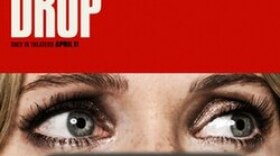-
Tim Clare is an author, poet and podcast presenter, and he joins us today to talk about his new book, "Across the Board: How Games Make Us Human."
-
-
As diurnal creatures, humans often miss out on the natural world at night. And many of us have a natural urge to see the animals that come out at night as inherently worse, scarier, more disgusting, or more dangerous than their daytime counterparts. But if we set aside our distrust of what comes out at night, we’ll find ourselves stunned by what night time nature has to offer. And in his new book, that’s exactly what Charles Hood does.
-
"Drop" ends up being a juvenile, absurd experience I could not take seriously. Comedy can have its place in a thoughtful thriller, but it has to be written smoothly enough and naturally enough.
-
Today we’ll look at how several Utah organizations have been affected by recent federal funding cuts, including Utah Humanities, Cannon Heritage Consultants, and Utahns Against Hunger.
-
While this nation has yet to elect its first woman president — and though history has downplayed her role — just over a century ago a woman became the nation’s first acting president.
-
A bird of the prairie and countryside, the western meadowlark releases songs synonymous with spring grasslands flush with balsam root, lupine, death camas, larkspur, prairie smoke, and wind tossed grasses that shimmer in morning sun.
-
Tammy Proctor is joined by Sarah Neville, author of "Early Modern Herbals and the Book Trade." She explains what an herbal is and remedies for various conditions.
-
Tribune reporters Emily Anderson Stern, Robert Gehrke, and Tony Semerad talk about the latest news, including Bernie Sanders drawing a massive crowd during his ‘Fight Oligarchy’ tour in Utah.
-
The Friends of the Logan Library are presenting a screening of the film "Banned Together: The Fight Against Censorship," along with a panel discussion. We talk with panel members and discuss book bans.
-
What is life? However you answer that question, there is a good chance that it’s limited in some way by something that recent research has shown is not actually a limit. What living things can breathe, how they derive energy, how long they can live, and even whether they must die are all being challenged by what we’re learning from microorganisms. In her new book, “Intraterrestrials,” Karen Lloyd tells the story of exploring those limits among the strangest species on our planet.
-
What is life? However you answer that question, there is a good chance that it’s limited in some way by something that recent research has shown is not actually a limit. What living things can breathe, how they derive energy, how long they can live, and even whether they must die are all being challenged by what we’re learning from microorganisms. In her new book, “Intraterrestrials,” Karen Lloyd tells the story of exploring those limits among the strangest species on our planet.















